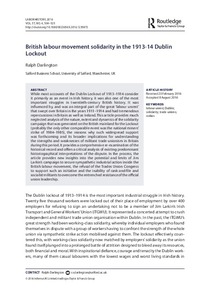British labour movement solidarity in the 1913-14 Dublin Lockout

2016
57
4
Oct.
504-525
history ; labour dispute ; lockout ; strike ; trade union attitude ; trade union solidarity ; TUC
Labour disputes
http://dx.doi.org/10.1080/0023656X.2016.1239872
English
Bibliogr.
"While most accounts of the Dublin Lockout of 1913–1914 consider it primarily as an event in Irish history, it was also one of the most important struggles in twentieth-century British history. It was influenced by, and was an integral part of the great ‘labour unrest' that swept over Britain in the years 1911–1914 and had tremendous repercussions in Britain as well as Ireland. This article provides much neglected analysis of the nature, extent and dynamics of the solidarity campaign that was generated on the British mainland for the Lockout (probably the only other comparable event was the national miners' strike of 1984–1985), the reasons why such widespread support was forthcoming and its broader implications for understanding the strengths and weaknesses of militant trade unionism in Britain during this period. It provides a comprehensive re-examination of the historical record and offers a critical analysis of existing predominant historiographical interpretations of the dispute. In the process, the article provides new insights into the potential and limits of Jim Larkin's campaign to secure sympathetic industrial action inside the British labour movement, the refusal of the Trades Union Congress to support such an initiative and the inability of rank-and-file and socialist militants to overcome the entrenched resistance of the official union leadership."
Digital
The ETUI is co-funded by the European Union. Views and opinions expressed are however those of the author(s) only and do not necessarily reflect those of the European Union or the ETUI.